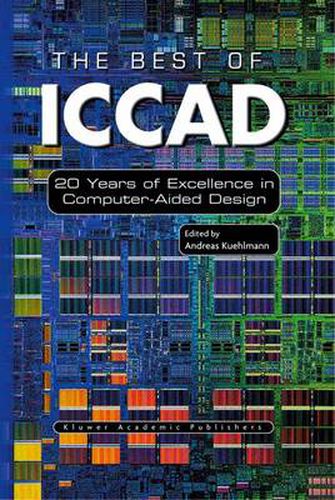Readings Newsletter
Become a Readings Member to make your shopping experience even easier.
Sign in or sign up for free!
You’re not far away from qualifying for FREE standard shipping within Australia
You’ve qualified for FREE standard shipping within Australia
The cart is loading…






This title is printed to order. This book may have been self-published. If so, we cannot guarantee the quality of the content. In the main most books will have gone through the editing process however some may not. We therefore suggest that you be aware of this before ordering this book. If in doubt check either the author or publisher’s details as we are unable to accept any returns unless they are faulty. Please contact us if you have any questions.
In 2002, the International Conference on Computer Aided Design (ICCAD) celebrates its 20th anniversary. This book commemorates contributions made by ICCAD to the broad field of design automation during that time. The foundation of ICCAD in 1982 coincided with the growth of Large Scale Integration. The sharply increased functionality of board-level circuits led to a major demand for more powerful Electronic Design Automation (EDA) tools. At the same time, LSI grew quickly and advanced circuit integration became widely avail able. This, in turn, required new tools, using sophisticated modeling, analysis and optimization algorithms in order to manage the evermore complex design processes. Not surprisingly, during the same period, a number of start-up com panies began to commercialize EDA solutions, complementing various existing in-house efforts. The overall increased interest in Design Automation (DA) re quired a new forum for the emerging community of EDA professionals; one which would be focused on the publication of high-quality research results and provide a structure for the exchange of ideas on a broad scale. Many of the original ICCAD volunteers were also members of CANDE (Computer-Aided Network Design), a workshop of the IEEE Circuits and Sys tem Society. In fact, it was at a CANDE workshop that Bill McCalla suggested the creation of a conference for the EDA professional. (Bill later developed the name).
$9.00 standard shipping within Australia
FREE standard shipping within Australia for orders over $100.00
Express & International shipping calculated at checkout
This title is printed to order. This book may have been self-published. If so, we cannot guarantee the quality of the content. In the main most books will have gone through the editing process however some may not. We therefore suggest that you be aware of this before ordering this book. If in doubt check either the author or publisher’s details as we are unable to accept any returns unless they are faulty. Please contact us if you have any questions.
In 2002, the International Conference on Computer Aided Design (ICCAD) celebrates its 20th anniversary. This book commemorates contributions made by ICCAD to the broad field of design automation during that time. The foundation of ICCAD in 1982 coincided with the growth of Large Scale Integration. The sharply increased functionality of board-level circuits led to a major demand for more powerful Electronic Design Automation (EDA) tools. At the same time, LSI grew quickly and advanced circuit integration became widely avail able. This, in turn, required new tools, using sophisticated modeling, analysis and optimization algorithms in order to manage the evermore complex design processes. Not surprisingly, during the same period, a number of start-up com panies began to commercialize EDA solutions, complementing various existing in-house efforts. The overall increased interest in Design Automation (DA) re quired a new forum for the emerging community of EDA professionals; one which would be focused on the publication of high-quality research results and provide a structure for the exchange of ideas on a broad scale. Many of the original ICCAD volunteers were also members of CANDE (Computer-Aided Network Design), a workshop of the IEEE Circuits and Sys tem Society. In fact, it was at a CANDE workshop that Bill McCalla suggested the creation of a conference for the EDA professional. (Bill later developed the name).